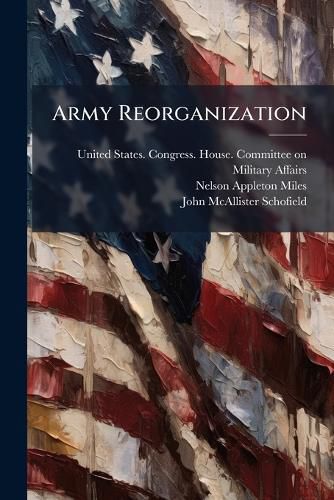Readings Newsletter
Become a Readings Member to make your shopping experience even easier.
Sign in or sign up for free!
You’re not far away from qualifying for FREE standard shipping within Australia
You’ve qualified for FREE standard shipping within Australia
The cart is loading…






Army Reorganization presents a detailed record of discussions and debates surrounding potential reforms within the United States Army. Featuring testimonies from prominent figures such as Nelson Appleton Miles and John McAllister Schofield, this historical document offers invaluable insights into the challenges and considerations involved in shaping military policy.
Originally compiled from hearings before the Committee on Military Affairs of the House of Representatives, this work sheds light on the intricate process of legislative decision-making concerning national defense. Students and researchers of military history and political science will find this a vital resource for understanding the evolution of the U.S. Army and the complexities of governmental oversight.
This work has been selected by scholars as being culturally important, and is part of the knowledge base of civilization as we know it. This work was reproduced from the original artifact, and remains as true to the original work as possible. Therefore, you will see the original copyright references, library stamps (as most of these works have been housed in our most important libraries around the world), and other notations in the work.
This work is in the public domain in the United States of America, and possibly other nations. Within the United States, you may freely copy and distribute this work, as no entity (individual or corporate) has a copyright on the body of the work.
As a reproduction of a historical artifact, this work may contain missing or blurred pages, poor pictures, errant marks, etc. Scholars believe, and we concur, that this work is important enough to be preserved, reproduced, and made generally available to the public. We appreciate your support of the preservation process, and thank you for being an important part of keeping this knowledge alive and relevant.
$9.00 standard shipping within Australia
FREE standard shipping within Australia for orders over $100.00
Express & International shipping calculated at checkout
Stock availability can be subject to change without notice. We recommend calling the shop or contacting our online team to check availability of low stock items. Please see our Shopping Online page for more details.
Army Reorganization presents a detailed record of discussions and debates surrounding potential reforms within the United States Army. Featuring testimonies from prominent figures such as Nelson Appleton Miles and John McAllister Schofield, this historical document offers invaluable insights into the challenges and considerations involved in shaping military policy.
Originally compiled from hearings before the Committee on Military Affairs of the House of Representatives, this work sheds light on the intricate process of legislative decision-making concerning national defense. Students and researchers of military history and political science will find this a vital resource for understanding the evolution of the U.S. Army and the complexities of governmental oversight.
This work has been selected by scholars as being culturally important, and is part of the knowledge base of civilization as we know it. This work was reproduced from the original artifact, and remains as true to the original work as possible. Therefore, you will see the original copyright references, library stamps (as most of these works have been housed in our most important libraries around the world), and other notations in the work.
This work is in the public domain in the United States of America, and possibly other nations. Within the United States, you may freely copy and distribute this work, as no entity (individual or corporate) has a copyright on the body of the work.
As a reproduction of a historical artifact, this work may contain missing or blurred pages, poor pictures, errant marks, etc. Scholars believe, and we concur, that this work is important enough to be preserved, reproduced, and made generally available to the public. We appreciate your support of the preservation process, and thank you for being an important part of keeping this knowledge alive and relevant.